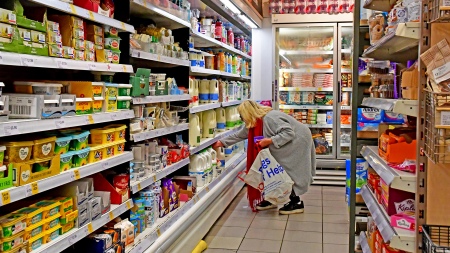Producers in the largest agricultural regions in the United Kingdom warned this Friday that the shortage of some fruit and vegetable products such as tomatoes and bell peppers could be extended until May due to labor shortages, rising energy costs, inflation and supply chain issues from climate change.
This led some of the country’s largest supermarket chains to set limits on products such as cucumbers, lettuce, bell peppers, tomatoes, raspberries, salad bags and eggs.
The Lea Valley Growers Association (LVGA)reported that major UK farmers are delaying planting of some crops due to high energy costs.
According to what was reported by the BBC, this means that the shortages in supermarkets will not end in one to two weeks, as suggested by Teresa Ana Coffey, secretary of the Department for Environment, Food and Rural Affairs (Defra).
“Most of the tomatoes, peppers and aubergines won’t be available in large quantities until May, so that will extend beyond a few weeks.”warned Lee Stiles, secretary of the LVGA.
? Hunger isn’t about a lack of food, it’s about a lack of income.
We’re pleased to see that the Government published guidance in the #HouseholdSupportFund today, stating that local councils should use cash grants alongside advice to support people facing financial hardship ⤵️ pic.twitter.com/XTE02HuVS7
— The Trussell Trust (@TrussellTrust) February 21, 2023
The Association explained that although the weather conditions in Spain and Morocco are the main reason behind the current shortage, the situation is becoming even more complicated due to the delay in planting crops by British producers.
These have been discouraged due to the high energy costs for the greenhouses, as well as the low prices that supermarkets offer for their products.
Labor shortages also affected the UK, especially in the poultry industry, horticultural agriculture and pig farms.
This is partly due to post-war restrictions. Brexit to freedom of movement.
Additionally, extreme weather in the UK and many European producing countries affected crop and livestock yields, which also contributed to food shortages and is expected to affect imports over the coming weeks.

Survey: Brits note lack of food
According to a survey by the British consultancy YouGov, the 61 percent of UK respondents they said they had personally noticed or experienced food shortages at their local stores or supermarkets in recent weeks.
According to Minette Batters, president of the National Farmers Union (NFU) of England and Waleseveryone wants to avoid the rationing that was seen with eggs in December.
However, with production costs still outpacing profits, British farmers have faced a “Perfect storm” of events.

















